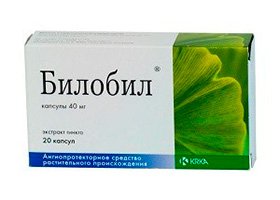
All iLive content is medically reviewed or fact checked to ensure as much factual accuracy as possible.
We have strict sourcing guidelines and only link to reputable media sites, academic research institutions and, whenever possible, medically peer reviewed studies. Note that the numbers in parentheses ([1], [2], etc.) are clickable links to these studies.
If you feel that any of our content is inaccurate, out-of-date, or otherwise questionable, please select it and press Ctrl + Enter.
Bilobil
Medical expert of the article
Last reviewed: 04.07.2025

Bilobil has antihypoxic, angioprotective, neurometabolic and antioxidant properties, and in addition, it improves microcirculation processes and potentiates cerebral and peripheral blood flow.
It is a herbal preparation; it stabilizes cellular metabolism, tissue perfusion and rheological blood characteristics.
Helps improve cerebral blood flow and promotes saturation of the brain with oxygen and glucose. The drug slows down erythrocyte aggregation and inhibits platelet activation. Depending on the portion size, it regulates the effect on the vessels, activates NO production, increases venous tone, which leads to a change in the filling of the vessels with blood, and dilates arterioles. Strengthens the strength of the vascular walls.
ATC classification
Active ingredients
Pharmacological group
Pharmachologic effect
Indications Bilobila
It is used for disorders of peripheral blood flow and microcirculation, and also for Raynaud's disease.
Prescribed in cases of DEP associated with trauma, stroke, age and other factors, in which there is a deterioration in attention and memory, a weakening of cognitive indicators and a change in the daily routine.
Can be used for neurosensory disorders (dizziness, tinnitus, hypoacusis, etc.), diabetic retinal disease and age-related macular degeneration.
Release form
The medicine is released in capsules - 10 pieces inside a cellular package. In a box - 2 or 6 such packages.
 [ 5 ]
[ 5 ]
Pharmacodynamics
The drug has an antithrombotic effect (strengthens the strength of platelet and erythrocyte walls, affects the biosynthesis of PG and reduces the effectiveness of the platelet-activating factor). Slows down the processes of peroxidation of fat inside the cell walls and the formation of free radical elements. Stabilizes the exchange of neurotransmitters (norepinephrine, dopamine and acetylcholine).
At the same time, it has antihypoxic activity, stimulates metabolism, helps with the accumulation of macroergs, increases the rate of utilization of oxygen with glucose and regulates mediating processes within the brain.
Pharmacokinetics
The bioavailability of ginkgolides with bilobalide is 85%. The Cmax level is noted after 120 minutes from the moment of taking the drug. The half-life is within 4-10 hours.
The molecules of these components are not subject to breakdown within the body, being completely excreted in urine and feces (a smaller part).
Dosing and administration
Bilobil capsules are swallowed whole with plain water. Before use, you should consult a doctor regarding the use of the drug. Significant improvement in the condition is possible after 1 month of therapy. The duration of the treatment cycle should be at least 3 months.
Using standard capsules.
In case of treatment of DEP, it is necessary to take 1-2 capsules of the medication 3 times a day.
For disorders of peripheral blood flow and microcirculation, as well as Raynaud's disease, the medicine is taken 3 times a day, 1 capsule.
In case of neurosensory disorders, diabetic retinopathy and age-related macular degeneration, 1 capsule should be used 3 times a day.
Use of the drug in the form of Bilobil Intense 120, as well as Bilobil Forte.
Bilobil Forte should be taken 2-3 times a day, 1 capsule each, and the medicinal form Intens 120 should be taken 1 time (in the morning) or 2 times (in the morning and also in the evening), 1 capsule each.
 [ 7 ]
[ 7 ]
Use Bilobila during pregnancy
It is prohibited to use the medicine in case of pregnancy or breastfeeding.
Contraindications
Main contraindications:
- gastritis of an erosive nature;
- weakened coagulability;
- disorders of cerebral blood flow in the active phase;
- ulcer in an acute form;
- myocardial infarction;
- severe intolerance to the components of the medication.
 [ 6 ]
[ 6 ]
Side effects Bilobila
Side effects include:
- disorders of the nervous system: dizziness, insomnia, hearing disorders and headaches;
- manifestations of allergy: swelling, hyperemia or itching;
- digestive disorders: nausea, diarrhea or vomiting;
- other symptoms: deterioration of blood clotting processes.
Shelf life
Bilobil is permitted to be used for a period of 36 months from the date of manufacture of the medicinal substance.
Application for children
Bilobil should not be prescribed in pediatrics (under 18 years of age).
 [ 12 ]
[ 12 ]
Analogues
Analogues of the drug are Vitrum Memory, Gingium, Memoplant with Ginos, and in addition to this, Ginkgo Biloba, Tanakan and Ginkoum.
 [ 13 ]
[ 13 ]
Reviews
Bilobil receives good reviews from doctors - it has been proven that the drug is very effective in improving cognitive activity in older people. But it should be taken into account that testing has confirmed a high probability of relapse of pathological symptoms after discontinuation of the drug.
Manufacturer
Attention!
To simplify the perception of information, this instruction for use of the drug "Bilobil" translated and presented in a special form on the basis of the official instructions for medical use of the drug. Before use read the annotation that came directly to medicines.
Description provided for informational purposes and is not a guide to self-healing. The need for this drug, the purpose of the treatment regimen, methods and dose of the drug is determined solely by the attending physician. Self-medication is dangerous for your health.

